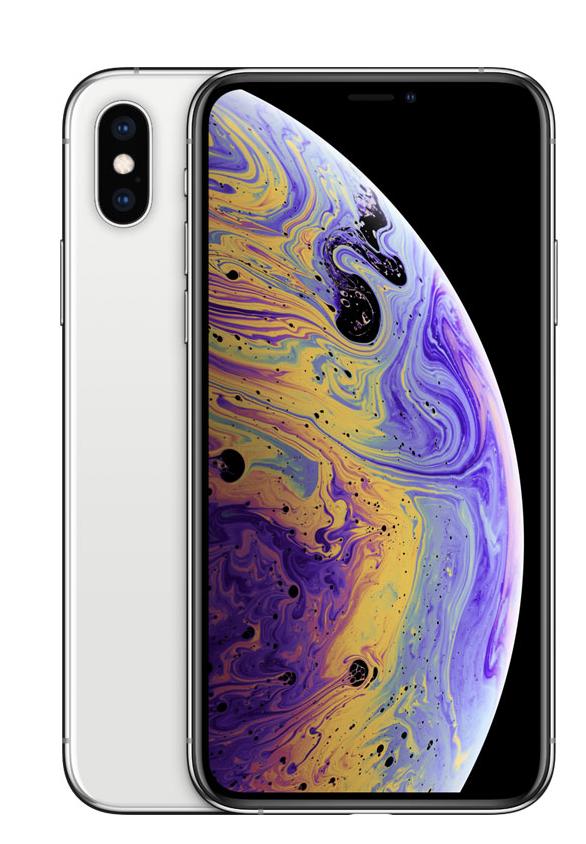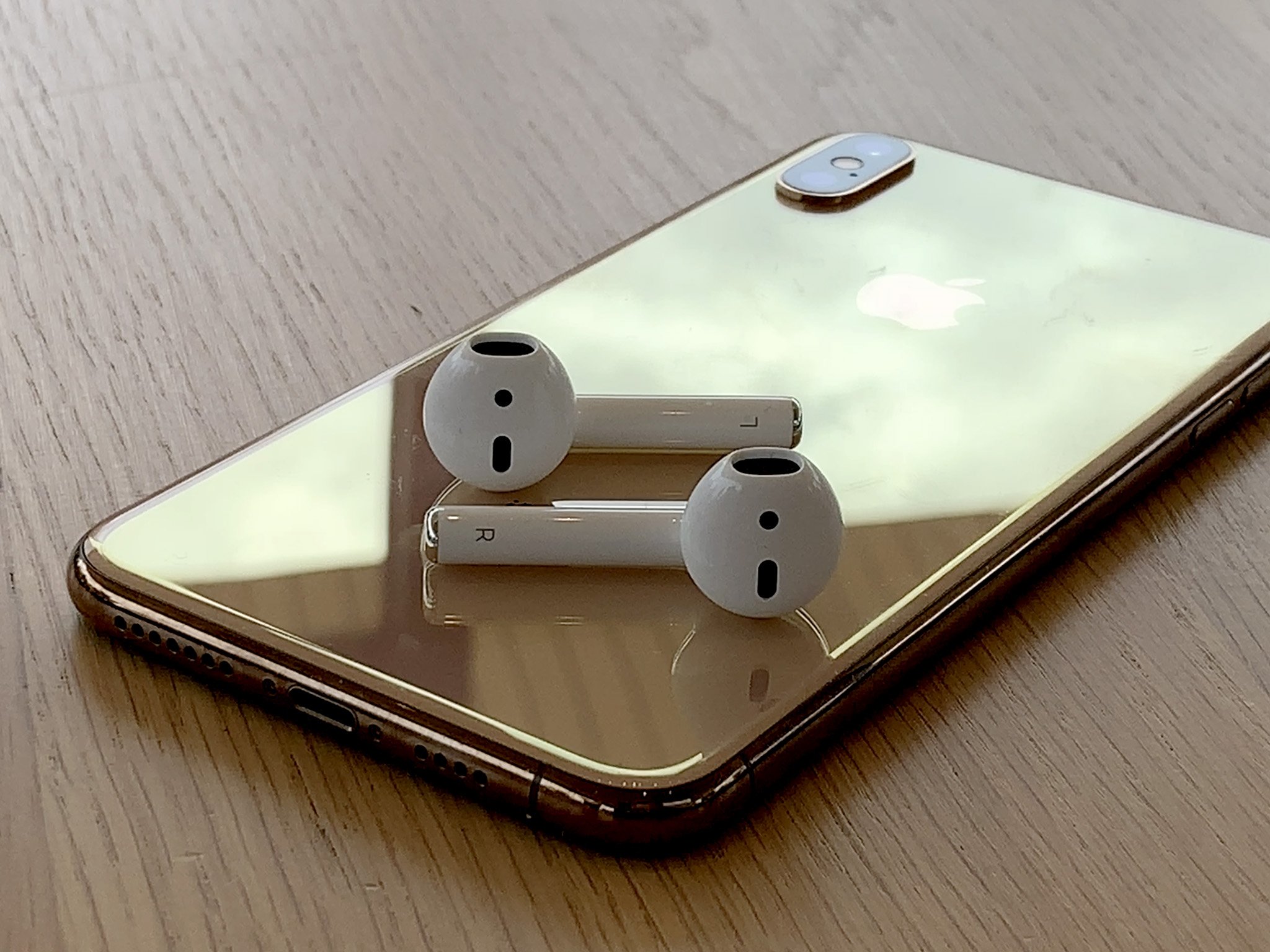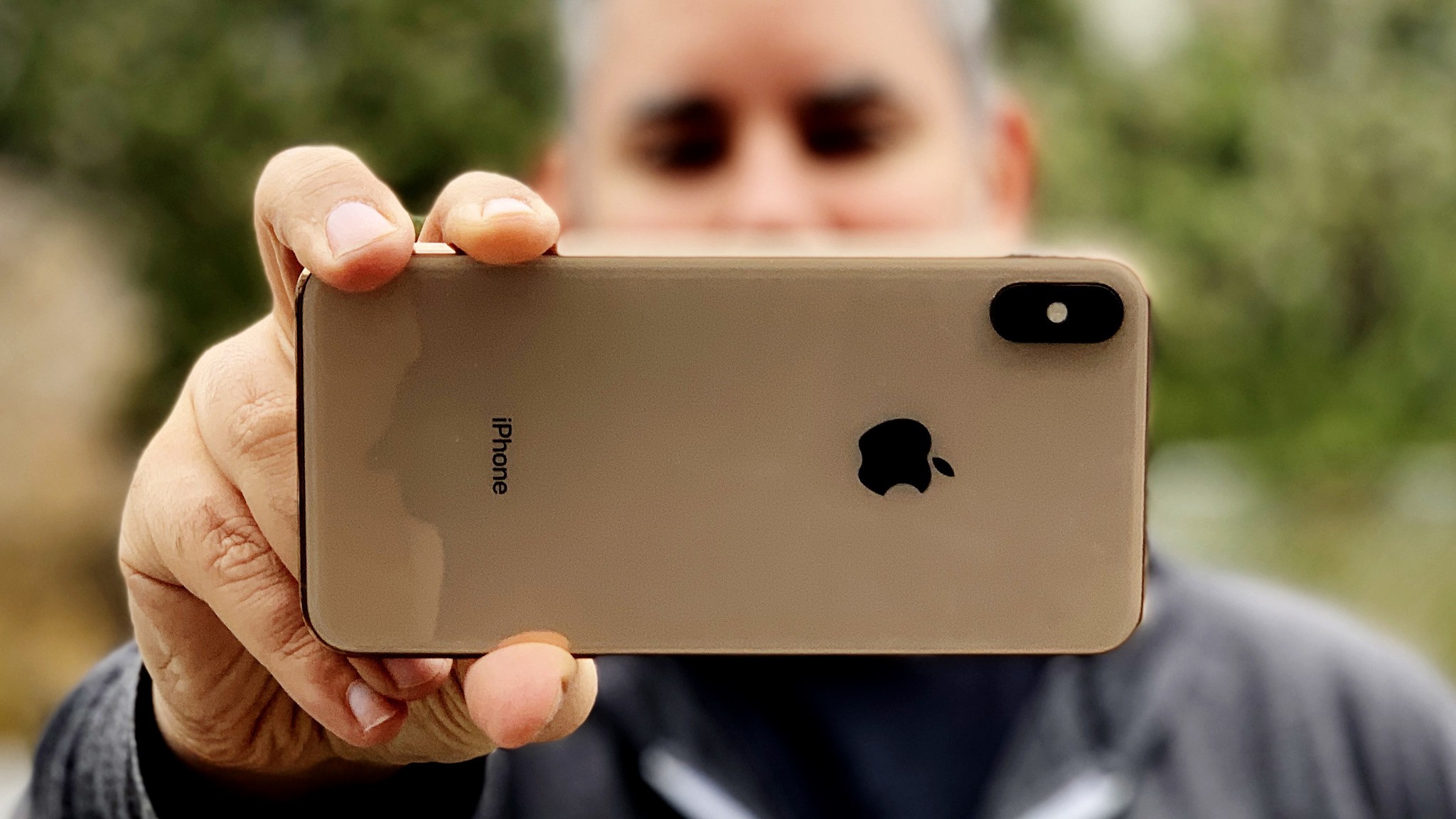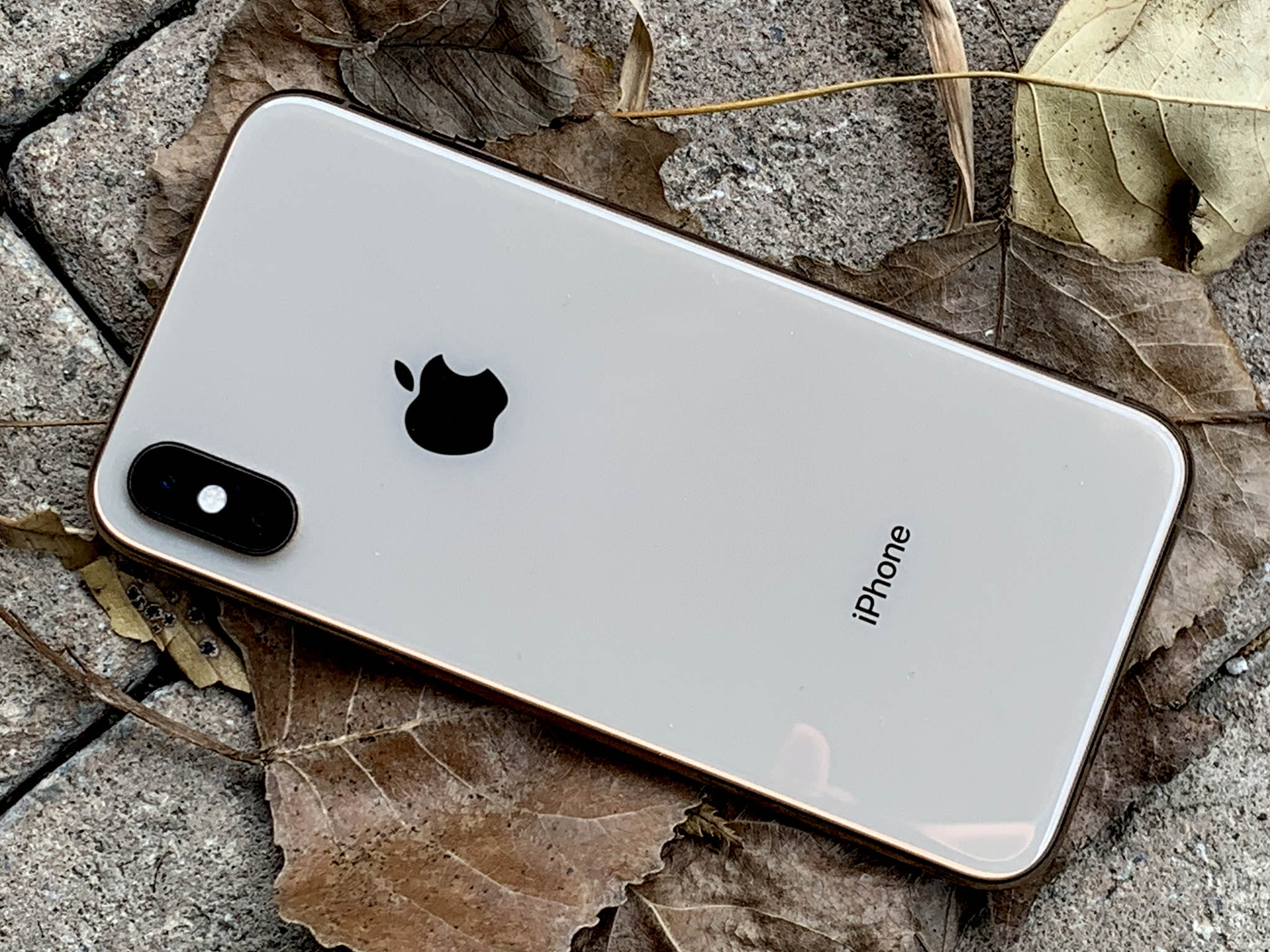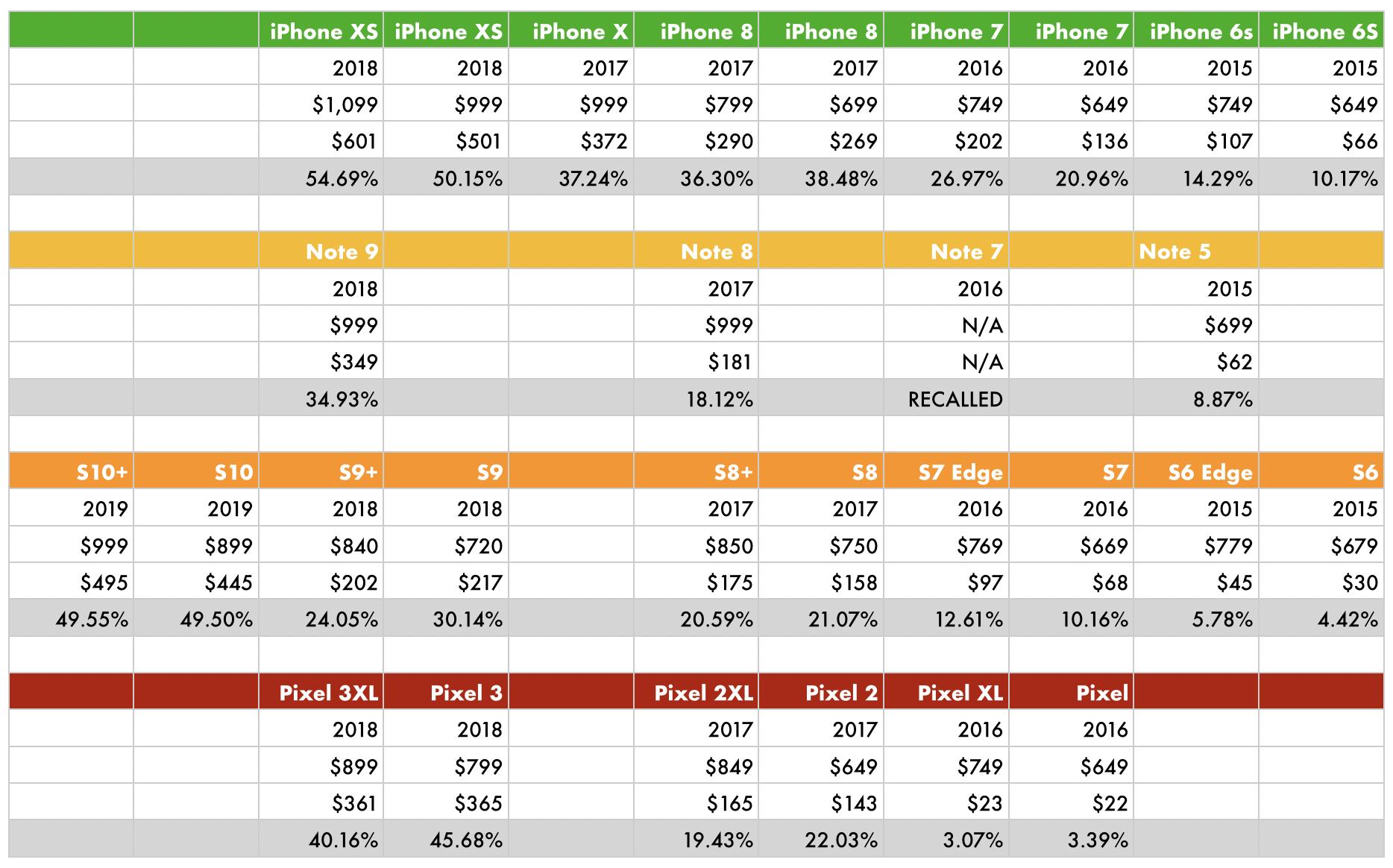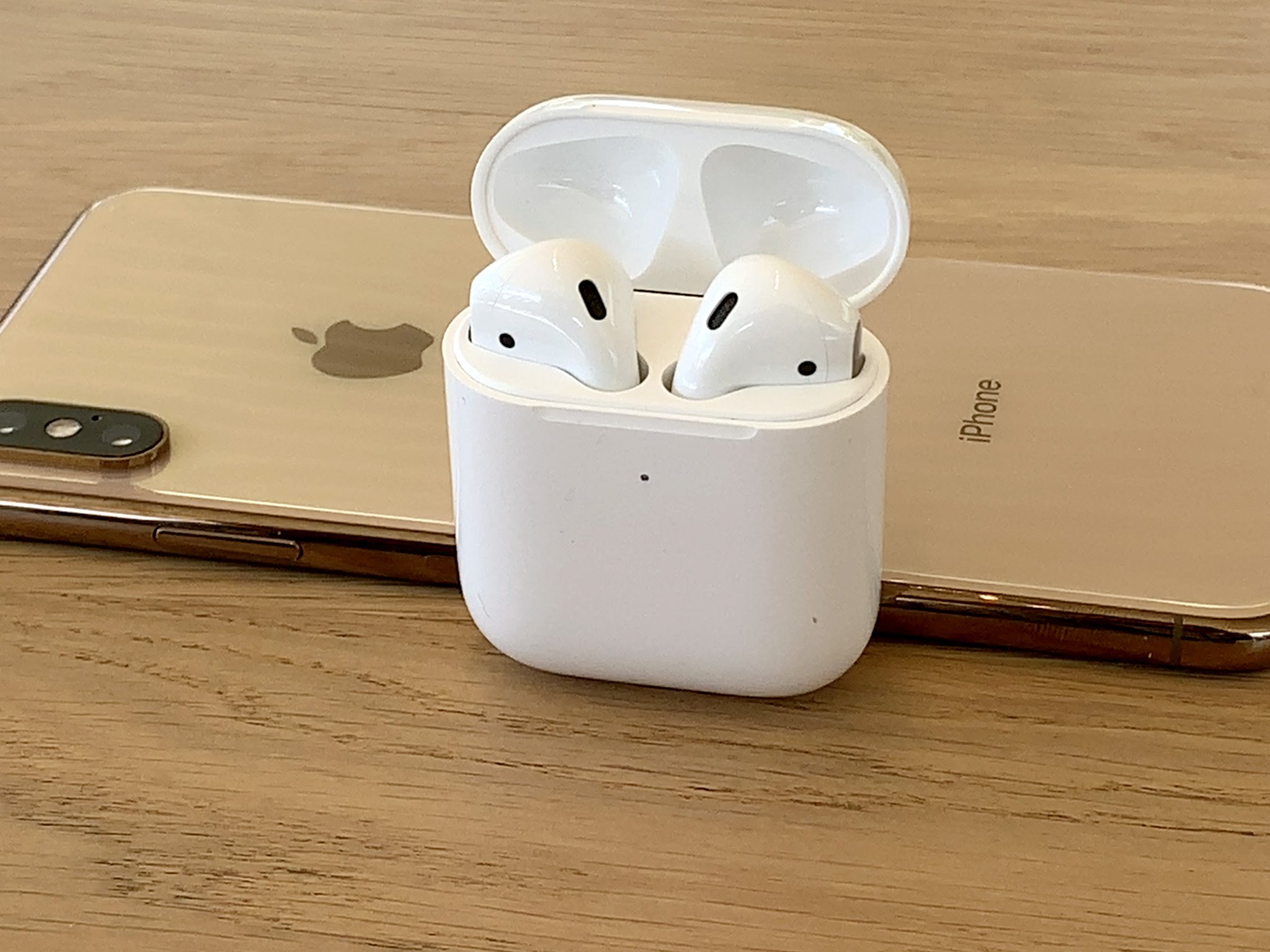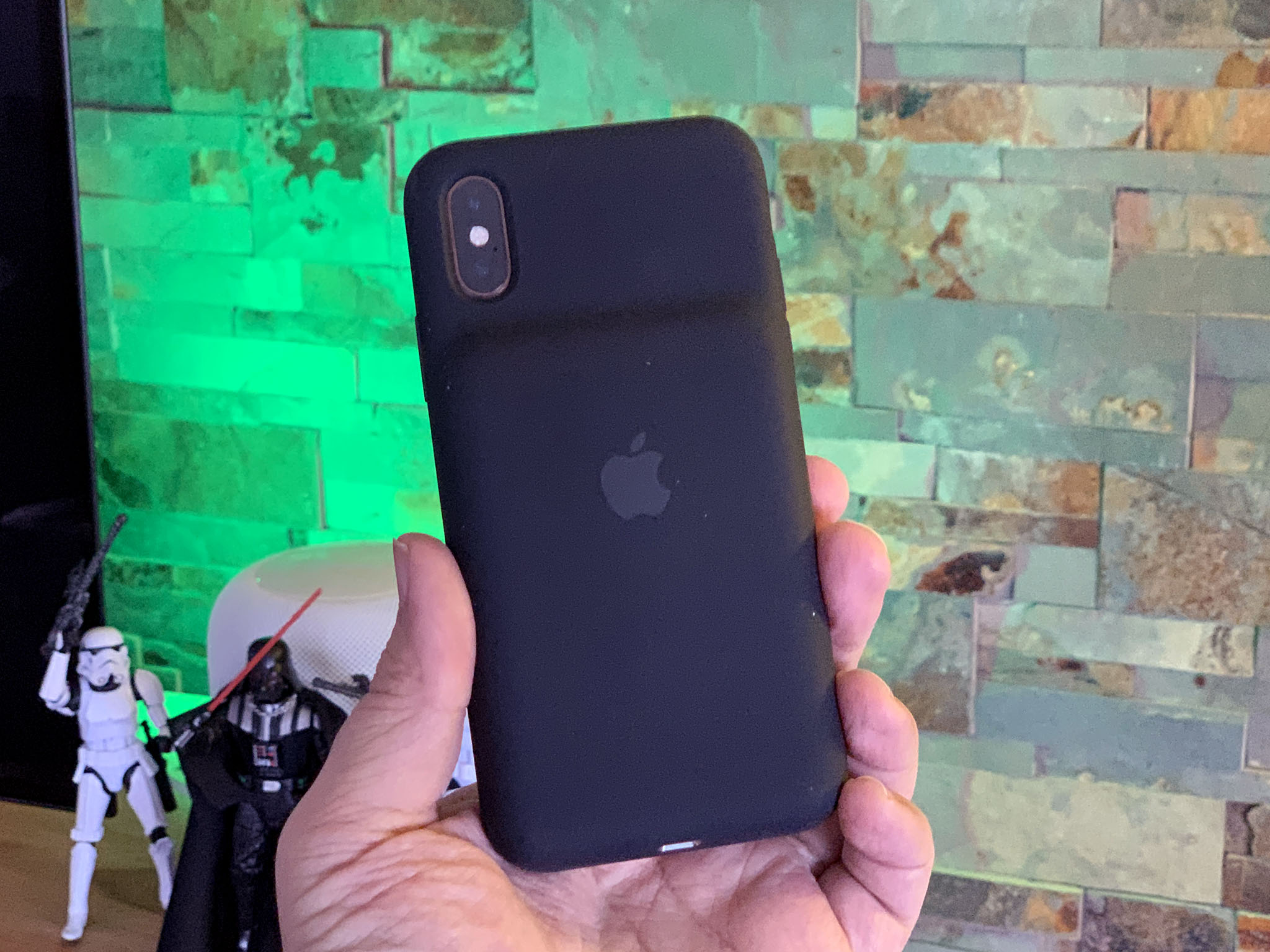iPhone XS Review — 7-Month Later
- apr
- 22
- Posted by Michael
- Posted in Okategoriserade
Over the last 7 months, I've come to realize something about the iPhone XS. It's not just the experience that keeps me coming back, although I appreciate how consistent and considerate it remains. It's the reliability. The trust.
We make a lot of mistakes in this business. One of the biggest is forgetting just who exactly it is we review things for. The vast majority of you aren't buying new phones every year, much less every few months. You're using what you have until you can or are forced to get something new. You're not jumping from review unit to review unit every few weeks. You're living with what you spend your hard-earned cash on for years and years.
You care about how it compares to the two or three or more year phone currently in your pocket, maybe, and other options on the market, a little, but the cost of switching is high, so you mostly what you want to know is if you'll be getting what you pay for. If you'll be getting value for your money, now and over the next two or three or more years you'll be using it.
We forget that. We throw up spec lists without any context and spend more time on flashy new features than overall experience and reliability. So, I want to try and fix that here.
I've been using the iPhone XS since Apple introduced it back in September of 2018, some seven months ago, and here's how it's holding up.
Rather watch than read? Hit play on the video above!
iPhone XS in Brief
For people who want:
- Edge-to-edge design.
- Optically stabilized ƒ/1.8 and ƒ/2.4 dual-camera system.
- Depth-aware front-facing camera.
- Face ID biometrics.
- A big 5.8 or bigger 6.5-inch display.
- Gold!
Not for people who want:
- Classic iPhone design.
- Home button.
- Fingerprint identity biometrics.
- Lower pricing.
- Android
Our pick
iPhone XS
iPhone X: The Next Generation.
iPhone X was all new. iPhone XS is just all better. Better camera, better battery, better Face ID, better performance, and a new gold option. More than just being a great user experience, 7-months later something else is clear as well: It's a phone you can rely on. A phone you can trust.
Previously, on iPhone XS…
For all the details and feature deep dives, please see the original iPhone XS and XS Max review, and the 3-week later follow up.
iPhone XS Max is still Max
In my 3-week later review, I said that the iPhone XS Max was Max in every sense of the word. That it wasn't a replacement for the then-still-not-but-now-thankfully-updated 7.9-inch iPad mini and its 4:3 aspect ratio and multi-window apps. But that, thanks to its 6.5-inch edge-to-edge display, it still felt a lot like a tiny tablet.
Having used Plus-sized iPhones almost exclusively from 6 to 6s to 7, even 8 on-and-off thanks to there being no first-get X Max, I figured big would go back to being my go to.
But it really hasn't. The display is just big enough to make it less convenient than the non-Max, without having either the old Plus benefits like landscape Home screen or iPad mini style multi-window apps, stacked in portrait or side-by-side in landscape.
And since the non-max is now 5.8-inches, I find it more than big enough for all the normal iPhone things. Especially now that there's a Smart Battery Case for all the X-class iPhones.
I get extra, extra long life when I need it, like when I'm traveling and tormented by poor signal and poorly tuned international carriers on roaming, or, yeah, out at a multi-hour-long Pokemon Go event. And the rest of the time, I get a light, slim phone that's easy to pocket, easy to hold, easy to shoot with, also for multiple hours a day.
Best of both worlds, and so much so, I hope Apple builds a version with better lenses, bigger speakers, stands, and other options in the future. It would be the modular phone finally done right.
iPhone XS Camera
With the iPhone XS, Apple integrated the new multi-core neural engine into the image signal processor of the A12 Bionic chipset, which let them do a lot of heavy pixel pushing, like Smart HDR for stills and extended dynamic range for up to 4K, 30 frames-per-second video.
The biggest compliment I can give both of those things is that I turned them on, left them on, and don't even think about them anymore.
There was an issue during the first few weeks when Smart HDR was misfiring on the selfie-cam and making most of us look far too smooth and far too rosy, but Apple fixed that early on in an update.
I said in my three-weeks later review my criteria for judging any camera, attached to a phone or not, is whether it lets me get photos I simply never could before. Like the iPhone 7 Plus, optically in low light and computationally with portrait mode. I
Both have gotten progressively better since. iPhone XS doesn't have anything like the post-processing Google or Huawei are using to deliver night-as-daylight shots, and that's hugely important so I hope they're working on it and we get it soon. But Smart HDR has gotten really good, almost too good, at resolving details in both shadow and light, and depth effect not only looks beautiful with its virtual lens models, but you can use it to bokeh out a child. Not that I would ever do that.
But, more recently, I've added another criteria for judging cameras — reliability.
I was at CES with my friends and colleagues from Android Central and they were complaining about their Pixel 3 cameras, simply not launching when they needed it to, and forcing them to miss shots they really needed.
I came to learn later it also had a problem actually saving photos and frames in video. And even when Google pushed out an update, it only made it fail less often. Which, ended up being absolutely unacceptable to them and to other high-profile reviewers.
That's something, as someone who primarily shoots with iPhone, including almost all the b-roll for almost all the videos on this channel, I simply never have to worry about.
Apple has gone so far as to build a custom storage controller into their custom silicon to make sure every burst, every frame gets saved. As a user, it's not something I really think about, probably not something most people even realize is there, except through the reliability and trust we've developed for the camera.
I get that it's not as flashy as a periscope lens or night sight algorithms, and those are mind-blowingly cool and super useful and I totally want them as well.
But not all innovations are neon and we have to stop pretending otherwise. Some are the systems that keep the neon from flickering so damn annoyingly we turn it off. And we have to start recognizing that as well.
When it comes to the full imaging pipeline, from wide gamut capture to color science to color management to ensuring it's all saved, to wide gamut display and easy sharing, from high dynamic range stills to extended dynamic range, stereo video, even though other camera phones have single elements that I envy, no one else is coming close in terms of total package.
And when I'm out shooting burst mode action, or family portraits, or friend's special occasions, or capturing that tasty b-roll, or just, yeah, living life, that consistency, that dependability is what really matters.
iPhone XS Durability
I don't usually have a case on my iPhone. I test some, sometimes, and now use the battery case when I travel, but most of the time I use my iPhone the way nature and Jony Ive intended. I also don't baby it or any of my tech.
It's not just that I'm a fan of the Star Wars worn aesthetic, though I am, but that this stuff is supposed to save time and serve me, not take time being served by me. So, it'll get thrown in pockets with keys, fall off tables, and generally get knocked about a fair bit.
So, how has the iPhone XS faired? Better than the iPhone X. That shouldn't be a surprise, since it's got even stronger, better balanced glass, but it still is. It's proven remarkably resistant to scratches and scuffs, especially on the back.
I do have a few on the front. None that I notice when actually using it, but I can see them when I hold my phone up in just the right light.
Otherwise, it's as rock solid as the day I got it. Which, when you combine that glass with the stainless steel band, is about as solid a phone as I've ever felt.
That's probably why they maintain such good resale value. A flawless entry-level 64GB XS will get you over $500, XS Max over $600 from a popular trade in company. More if you sell it yourself.
Same service, 128GB Note 9, which is same era, higher capacity doesn't quite get you $350. 128GB Galaxy S10, which is 6-months newer and high capacity, won't even get you $450. 128 GB Pixel 3, same era, higher capacity, gets you to $365. Pixel 3XL, weirdly, just under that at $361.
As reviewers, we don't often talk about things like how well a phone retains its value, but it's incredibly important to people who need to sell their current phone in order to afford their next phone.
It's almost the equal and opposite aspect to the free education and trading Apple provides at retail. A family friend recently bought a Samsung phone because the carrier offered her a great deal. She was new to smartphones and didn't know where to start with it. I pointed her to Android Central, of course, but she knew my mom had gone to a bunch of the classes at our local Apple Store and wanted to know if she could do the same. All I could do was point her back to the same carrier kiosk and, needless to say, they were spectacularly less than helpful.
This is one of my biggest complaints about modern phones: As the companies that make them get more aggressive on features and less… restrained on pricing, they need to do a better job justifying those prices and explaining everything we get for our money.
Just like the eco-friendly slides on stage, I want to see the total value prop slide so I know just exactly what every company is offering for every dollar I'm paying.
iPhone XS Security
There's a faster Secure Enclave on the iPhone XS that, theoretically at least, makes Face ID faster. I can't say I've noticed. There are some occasions, like when my phone is on the table or charger or whatever, that I still miss Touch ID. But, the vast majority of the time, Face ID is so much less obtrusive it still feels if not transparent than certainly translucent.
Because it's Apple, it's also been tested and beaten up on by the biggest papers of record and by every YouTuber in tech. In an age where Samsung's face scanner is being fooled by photos and video, and their fingerprint sensors by 3D printers, that's the kind of reassurance, of review, no company can buy.
Though, as consumers, I sincerely think we should absolutely insist on for any and every phone. It's a huge advantage to Apple that their stuff gets the highest scrutiny in the industry. And that makes it a huge disadvantage to every other vendor.
There have been some issues on the Mac, and the FaceTime Group Call bug bit iPhone as well. And hard. Which is why I think Apple needs to do for security this year what it did for performance last year — dedicate time and resources to go back and nail everything down from the base level frameworks on up.
Privacy has also remained a top priority for Apple, even up to and including all the entertainment pre-announcements from last month. That might not sound important, but given how many entertainment services, how many games, are tracking not only our behavior but our location, it's critical.
There are still some areas I'd like to see Apple address, like Google being default search instead of an option alongside Duck Duck Go in setup buddy.
If you want to use Facebook or Google or Amazon, or any of their services, as a grown-ass adult, you can totally do that. But if you don't want to, you can use Apple or Microsoft or indie services, without having to log your entire phone into Google to begin with. And if, like me, you have to use Google for work, you can stay logged out of the services you don't absolutely need to be logged into, which is, admittedly, the best of the worst.
iPhone XS With AirPods 2
Thanks to the new H1 chip, pairing and switching is faster than ever. Where, previously, moving between the Mac and iPhone, which was my most common scenario, could take up to several taps and long, long seconds, now it's almost always almost instant.
Read the full AirPods 2 Review
Having Hey Siri on the AirPods is also great, yes, even when already having it on the phone. Because you don't have to stay with your phone. It can be in your pocket or bag, on the charger or in the glove compartment, and you can still get a lot of things done.
Not everything, though. Now that AirPods make everything almost transparent, the opacities that remain are super apparent. More specifically, anything that requires authentication, like unlocking doors or even just checking messages.
Because what's the point of having Hey Siri on AirPods when they answer back that you have to unlock your iPhone first? Maybe Apple can figure out something there, at least until they get a heart rate sensor into the AirPods themselves.
Meanwhile, the sound is the same for music, podcasts, video, and everything else, the mic is even better for calls, and the latency is so much better I haven't reached for wired headphones since I got them. Not for anything.
iPhone XS Conclusion
Over the last 7 months, I've come to realize something about the iPhone XS. It's not just the experience that keeps me coming back, although I appreciate how consistent and considerate it remains. It's the reliability. The trust. Not just during the first week or two when I'm doing my review but throughout the year that I typically keep using the phone, and the years that follow when I give them to family members to keep using.
My sister has my 6S Plus and my mom has my 7 Plus. They've been using them day in, day out, since they got them, for years, and they're still looking and working great. Especially with the performance improvements in iOS 12.
It's why everyone from pro photographers to survivalists trust the iPhone to keep their photos and to keep them safe.
Look, I've bought most Google phones most years, starting with the Nexus One, which I loved. I have a Huawei phone. I might even get one of the current Samsung's, because my work affords me that luxury. But, when it comes down to what really matters to me, year in, year out, the overall value of the iPhone is still impossible to beat. And that includes the iPhone XS.
If you've had your phone for a while and you think you're ready to upgrade but you're still now sure, and you just want to know, 7 months later, sales and promotions and whatever is tempting you, is the iPhone XS still worth getting? Is it worth being your next phone?
Apple kept the same basic iPhone design for 4 generations, from 6 to 8. Since the XS is only the second iteration of the new, modern design, I wouldn't expect any major changes again this year. Apple's also made it a point of competition and, yes, pride, to push out updates to every phone, on every carrier, in every region, all at the same time, all the time, for years. So, what you get now should last you a good long time.
Either way, my buying advice is always the same: If you can wait, wait as long as you can, because there'll always be something new around the corner. But if you need it or would benefit from getting it now, absolutely get and iPhone XS — or XR if you don't care about the OLED display or dual camera system and want to save some cash — now and have zero regrets. Because, again, there'll always be something new around the corner.
Our pick
iPhone XS
iPhone X: The Next Generation.
iPhone X was all new. iPhone XS is just all better. Better camera, better battery, better Face ID, better performance, and a new gold option. More than just being a great user experience, 7-months later something else is clear as well: It's a phone you can rely on. A phone you can trust.
Senaste inläggen
- M4 MacBook Pro: Everything you need to know
- Apple accused of using blood minerals from a region ’devastated by grave violations of human rights’ in its products
- Did Apple just email you to say your trade-in is canceled? Don’t panic, it’s a glitch
- On-device iOS 18 AI features tipped as Apple makes new open source LLM tools available online
- This Australian iPhone can use the EU’s third-party app stores and more, but it’s a messy workaround you probably shouldn’t try
Senaste kommentarer
Arkiv
- april 2024
- mars 2024
- februari 2024
- januari 2024
- december 2023
- november 2023
- oktober 2023
- september 2023
- augusti 2023
- juli 2023
- juni 2023
- maj 2023
- april 2023
- mars 2023
- februari 2023
- januari 2023
- december 2022
- november 2022
- oktober 2022
- september 2022
- augusti 2022
- juli 2022
- juni 2022
- maj 2022
- april 2022
- mars 2022
- februari 2022
- april 2021
- mars 2021
- januari 2021
- december 2020
- november 2020
- oktober 2020
- september 2020
- augusti 2020
- juli 2020
- juni 2020
- maj 2020
- april 2020
- mars 2020
- februari 2020
- januari 2020
- december 2019
- november 2019
- oktober 2019
- september 2019
- augusti 2019
- juli 2019
- juni 2019
- maj 2019
- april 2019
- mars 2019
- februari 2019
- januari 2019
- december 2018
- november 2018
- oktober 2018
- september 2018
- augusti 2018
- juli 2018
- juni 2018
- maj 2018
- april 2018
- mars 2018
- februari 2018
- januari 2018
- december 2017
- november 2017
- oktober 2017
- september 2017
- augusti 2017
- juli 2017
- juni 2017
- maj 2017
- april 2017
- mars 2017
- februari 2017
- januari 2017
- december 2016
- november 2016
- oktober 2016
- september 2016
- augusti 2016
- juli 2016
- juni 2016
- maj 2016
- april 2016
- mars 2016
- februari 2016
- januari 2016
- december 2015
- november 2015
- oktober 2015
- september 2015
- augusti 2015
- juli 2015
- juni 2015
- maj 2015
- april 2015
- mars 2015
- februari 2015
- januari 2015
- december 2014
- november 2014
- oktober 2014
- september 2014
- augusti 2014
- juli 2014
- juni 2014
- maj 2014
- april 2014
- mars 2014
- februari 2014
- januari 2014
Kategorier
- –> Publicera på PFA löp
- (PRODUCT) RED
- 2015
- 25PP
- 2nd gen
- 32gb
- 3D Touch
- 3D-kamera
- 4k
- 64gb
- 9to5mac
- A10
- A9X
- Aaron Sorkin
- Accessories
- adapter
- AirPlay
- AirPods
- Aktiv
- Aktivitetsarmband
- Aktuellt
- Alfred
- AMOLED
- Android Wear
- Angela Ahrendts
- Ångerätt
- announcements
- Ansiktsigenkänning
- app
- App Store
- Appar
- Apple
- Apple Beta Software Program
- Apple Book
- Apple CarPlay
- Apple Event
- Apple iMac
- Apple Mac Mini
- Apple Macbook
- Apple MacBook Air
- Apple MacBook Pro
- Apple Macos
- Apple Maps
- Apple Music
- Apple Music Festival
- Apple Music Radio
- Apple Offer
- Apple Online Store
- Apple Park
- Apple Pay
- Apple Pencil
- Apple Podcast
- Apple Store
- Apple Store 3.3
- Apple TV
- apple tv 4
- Apple TV 4K
- Apple Watch
- Apple Watch 2
- Apple Watch 8
- Apple Watch 9
- Apple Watch Apps
- Apple Watch SE
- Apple Watch Series 2
- Apple Watch Sport
- Apple Watch Ultra
- AppleCare
- AppleTV
- Application
- Applications
- Apps
- AppStore
- Apptillägg
- Apptips
- AppTV
- April
- Arbetsminne
- armband
- Art Apps
- Återköp
- återvinning
- Åtgärdsalternativ
- atvflash
- Audio Apps
- Augmented REality
- Back-to-school
- Bakgrundsbilder
- BankId
- Barn
- Batteri
- batteriskal
- batteritid
- Beats
- Beats 1
- Beats Solo 2 Wireless
- Beats Solo2
- Bebis
- Beginner Tips
- Belkin
- Bendgate
- beta
- Beta 3
- betaversion
- betaversioner
- bilddagboken.se
- bilder
- bilhållare
- billboard
- Bioteknik
- Blendtec
- Bloomberg
- Bloons TD 5
- Bluelounge
- Bluetooth
- Böj
- Booking.com
- Borderlinx
- bose
- bugg
- Buggar
- Buggfixar
- Butik
- C More
- Calc 2M
- Camera
- Campus 2
- Canal Digital
- Carpool Karaoke
- Caseual
- Catalyst
- CES 2015
- Chassit
- Chip
- Chrome Remote Desktop
- Chromecast
- citrix
- clic 360
- CNBC
- Connect
- Cydia
- Dagens app
- Dagens tips
- Damm
- Danny Boyle
- Data
- datamängd
- Datorer
- Datortillbehör
- Datum
- Defense
- Dekaler
- Designed by Apple in California
- Developer
- Development
- Digital Inn
- Digital Touch
- Digitalbox
- DigiTimes
- Direkt
- Discover
- display
- DisplayMate
- Dive
- Docka
- Dräger 3000
- Dropbox
- Droples
- DxOMark
- E-post
- earpod
- EarPods
- Earth Day
- Eddie Cue
- eddy cue
- Educational Apps
- Ekonomi
- Ekonomi/Bransch
- El Capitan
- Elements
- ElevationLab
- Elgato Eve
- Elgato Eve Energy
- EM 2016
- Emoji
- emojis
- emoticons
- Enligt
- EU
- event
- Eventrykten
- EverythingApplePro
- Faceshift
- facetime
- Fäste
- Featured
- Features
- Feng
- Film / Tv-serier
- Filmer
- Filstorlek
- Finance Apps
- Finder For AirPods
- Finland
- FireCore
- Fitbit
- Fitness Accessories
- Fjärrstyr
- Flurry
- Födelsedag
- fodral
- Förboka
- Force Touch
- förhandsboka
- Första intryck
- Forumtipset
- foto
- FoU (Forskning och Utveckling)
- Fource Touch
- Foxconn
- FPS Games
- Framtid
- Fre Power
- Frontpage
- Fullt
- Fuse Chicken
- Fyra
- Gadgets
- Gagatsvart
- Gamereactor
- Games
- Gaming
- Gaming Chairs
- Gästkrönika
- General
- Gigaset
- Gitarr
- Glas
- GM
- Google Maps
- Google Now
- gratis
- grattis
- Guide
- Guider
- Guider & listor
- Guld
- hack
- Halebop
- hållare
- Hälsa
- Hårdvara
- HBO
- HBO Nordic
- Health
- Health and Fitness
- Health and Fitness Apps
- Hej Siri
- Helvetica Neue
- Hemelektronik
- Hemknapp
- Hemlarm
- Hermes
- Hitta min iphone
- Hjärta
- högtalare
- HomeKit
- HomePod
- hörlurar
- htc
- Hue
- Humor
- i
- I Am A Witness
- IBM
- iBolt
- iBomber
- iBook
- icar
- iCloud
- iCloud Drive
- iCloud Voicemail
- iCloud.com
- iDevices
- IDG Play
- idownloadblog
- iFixit
- ikea
- iKörkort
- iLife
- Illusion Labs
- iMac
- IMAP
- iMessage
- iMessages
- iMore Show
- Incipio
- InFuse
- Inspelning
- Instagram-flöde
- Instrument
- Intel
- Internet/Webbtjänster
- iOS
- iOS 10
- iOS 12
- iOS 17
- iOS 18
- iOS 5
- iOS 7
- iOS 8
- iOS 8 beta
- iOS 8.1.3
- iOS 8.2
- iOS 8.3
- iOS 8.4
- iOS 8.4.1
- iOS 9
- iOS 9 beta 4
- iOS 9.1
- iOS 9.1 beta 2
- iOS 9.2
- iOS 9.2.1
- iOS 9.3
- IOS Games
- ios uppdatering
- ios9
- iPad
- iPad Accessories
- iPad Air
- iPad Air 2
- iPad Air 3
- iPad Apps
- iPad Mini
- iPad mini 4
- iPad Mini 6
- iPad mini retina
- iPad Pro
- iPados
- iphone
- iPhone 12
- iPhone 14
- iPhone 14 Pro
- iPhone 15
- iPhone 16
- iPhone 17
- iPhone 5
- iPhone 5S
- iPhone 5se
- iPhone 6
- iphone 6 plus
- iPhone 6c
- iPhone 6s
- iPhone 6S plus
- iPhone 7
- iPhone 7 display
- iPhone 7 Plus
- iPhone 7s
- iPhone Accessories
- iPhone Apps
- iPhone SE
- iphone x
- iPhone XS
- iPhone XS Max
- iPhone7
- iPhoneGuiden
- iPhoneguiden.se
- iPhones
- iPod
- iPod Nano
- iPod shuffle
- ipod touch
- iSight
- iTunes
- iWatch
- iWork
- iWork för iCloud beta
- Jailbreak
- James Corden
- Jämförande test
- Jämförelse
- Jet Black
- Jet White
- Jönssonligan
- Jony Ive
- Juice Pack
- Juridik
- Just mobile
- kalender
- kalkylator
- Kamera
- Kameratest
- Karriär/Utbildning
- Kartor
- Kevin Hart
- keynote
- Keynote 2016
- KGI
- KGI Security
- Kina
- Klassiskt läderspänne
- Kod
- Kollage
- koncept
- konceptbilder
- köpguide
- krasch
- Krascha iPhone
- Krönika
- Kvartalsrapport
- Laddhållare
- laddningsdocka
- Laddunderlägg
- läderloop
- lagar
- Lagring
- Lajka
- Länder
- lansering
- laserfokus
- Layout
- leather loop
- LG
- Liam
- Lifeproof
- Lightnigport
- lightning
- Linux
- LinX
- live
- Live GIF
- Live Photos
- Live-event
- Livsstil
- Ljud & Bild
- Logitech
- LOL
- Lösenkod
- Lösenkodlås
- Lovande spel
- LTE
- Luxe Edition
- M3
- M3TV
- Mac
- Mac App Store
- Mac Apps
- Mac Mini
- Mac OS
- Mac OS X
- Mac OS X (generellt)
- Mac OS X Snow Leopard
- Mac Pro
- Macbook
- Macbook Air
- Macbook Pro
- Macforum
- Macintosh
- macOS
- Macs
- MacWorld
- Made for Apple Watch
- magi
- Magic
- MagSafe
- Martin Hajek
- matematik
- Meddelanden
- Media Markt
- Medieproduktion
- Mediocre
- Messaging Apps
- Messenger
- MetaWatch
- Mfi
- Michael Fassbender
- microsoft
- Mikrofon
- Minecraft
- Ming-Chi Kuo
- miniräknare
- minne
- Mixer
- Mixning
- Mjukvara
- mobbning
- Mobile Content
- Mobilt
- Mobilt/Handdator/Laptop
- Mobiltelefon
- Mockup
- Mophie
- mors dag
- moto 360
- Motor
- MTV VMA
- multitasking
- Music
- Music Apps
- Music, Movies and TV
- Musik
- Musikmemon
- MW Expo 2008
- native union
- Nätverk
- Navigation Apps
- nedgradera
- Netatmo Welcome
- Netflix
- Netgear Arlo
- News
- Niantic
- Nike
- Nikkei
- Nintendo
- Nöje
- Norge
- Notis
- Notiscenter
- nya färger
- Nyfödd
- Nyheter
- Officeprogram
- Okategoriserade
- OLED
- omdöme
- Omsättning
- OS X
- OS X El Capitan
- OS X Mavericks
- OS X Yosemite
- Outlook
- Övrig mjukvara
- Övrigt
- PanGu
- papper
- patent
- PC
- pebble
- Pebble Smartwatch
- Pebble Steel
- Pebble Time
- Pebble Time Steel
- Persondatorer
- Petter Hegevall
- PewDiePie
- Philips
- Philips Hue
- Phones
- Photoshop
- Planet of the apps
- Plex
- Pluggar
- Plus
- Plusbox
- Podcast
- Podcast Apps
- Policy
- Porträttläge
- PP
- Pris
- priser
- problem
- Problems
- Productivity Apps
- Program
- Prylar & tillbehör
- Publik
- publik beta
- QuickTime
- räkenskapsår
- räkna
- ram
- RAM-minne
- Rapport/Undersökning/Trend
- Rea
- Reading Apps
- recension
- Red
- reklaamfilm
- reklam
- reklamfilm
- reklamfilmer
- rekord
- Rendering
- reparation
- Reportage
- Reptest
- ResearchKit
- Retro
- Review
- Ring
- Ringa
- Rocket Cars
- Rosa
- Rumors
- Rumours
- RunKeeper
- rykte
- Rykten
- Safir
- Säkerhet
- Säkerhetsbrist
- Samhälle/Politik
- samsung
- Samtal
- San Francisco
- SAP
- security
- Series 2
- Servrar
- Shigeru Miyamoto
- Sia
- Siri
- SJ Min resa
- skal
- Skal iPhone 6
- skal iPhone 6s
- skärm
- SKärmdump
- Skärmglas
- Skribent
- skribenter medarbetare
- Skriva ut
- skruvmejsel
- skydd
- Skyddsfilm
- Skype
- slice intelligence
- Smart
- smart hem
- Smart Home
- Smart Keyboard
- Smart klocka
- Smart Lights
- smartphone
- Smartwatch
- Snabbt
- Snapchat
- Social Apps
- Software
- Solo2
- sommar
- Sonos
- Sony
- soundtouch
- Space Marshals
- spår
- Speakers
- Special Event
- Spel
- Spelkonsol
- Spellistor
- Split Screen
- Split View
- Sport
- Sportband
- Sports Apps
- spotify
- Spring forward
- Statistik
- Steve Jobs
- Stickers
- Stockholm
- Stor iPhone
- Storlek
- Story Mode
- Strategy Games
- streama
- Streaming
- stresstest
- Ström
- Studentrabatt
- stylus
- Super Mario Run
- support
- Surf
- Surfplatta
- svenska
- sverige
- Sverigelansering
- Switch
- Systemstatus
- Systemutveckling
- tåg
- Taig
- Tangentbord
- Taptic Engine
- Tårta
- tät
- Tävling
- Taylor Swift
- Teknik
- tele 2
- Telefoner
- Telekom
- Telia
- Test
- Tid
- TikTok
- Tile
- tillbehör
- Tim Cook
- TIME
- TimeStand
- Tiny Umbrella
- Tips
- Toppnyhet IDG.se
- Touch ID
- TouchID
- tower defence
- trådlös laddning
- Trådlösa hörlurar
- trådlöst
- trailer
- Travel Apps
- Tre
- TrendForce
- TripAdvisor
- Trolleri
- trump
- TSMC
- Tum
- tv
- tvätta
- tvOS
- tvOS 9.2
- tvOS beta 2
- Tweak
- Typsnitt
- Ubytesprogram
- UE MegaBoom
- Unboxing
- Underhållning/Spel
- unidays
- United Daily News
- Unix
- Updates
- Uppdatera
- uppdatering
- Upplösning
- upptäckt
- USA
- Ut på Twitter
- utbyte
- utbytesprogram
- Utilities Apps
- Utlottning
- utrymme
- utvecklare
- varumärke
- Vatten
- Vattentålig
- vattentät
- vävt nylon
- Verktyg
- Viaplay
- Vibrator
- video
- Videoartiklar och webb-tv (M3/TW/CS)
- Villkor
- viloknapp
- Virtual Reality
- Virus
- visa
- Vision Pro
- VLC
- Volvo on call
- W1
- Waitrose
- Watch OS
- WatchOS
- WatchOS 2
- watchOS 2.0.1
- watchOS 2.2
- Webbtv (AppTV)
- wi-fi
- Wifi-samtal
- Windows
- Windows 8
- WWDC
- WWDC2015
- yalu
- Youtube
- Zlatan

